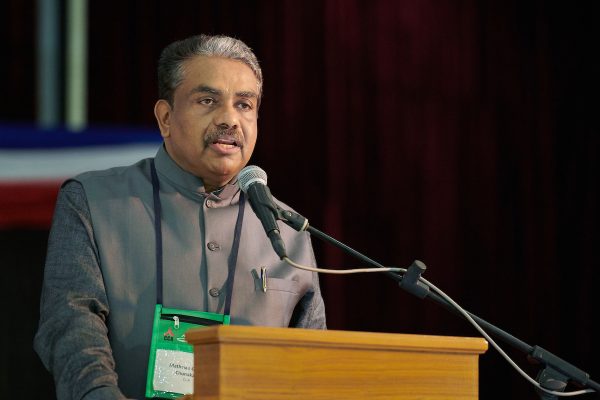Echoes from Yangon
 26 October 2017 - By Claus Grue* Photo Credits - Paul Jeffrey
26 October 2017 - By Claus Grue* Photo Credits - Paul Jeffrey
After six intensive days, offering plenty of food for thought, the Asia Mission Conference (AMC) in Yangon, Myanmar, came to an end with a sending out and closing session last Monday. With around 600 participants from all over the world – double from what was originally expected – the need to discuss, learn about and elaborate around mission was clearly affirmed.
The general secretary of the Christian Conference of Asia (CCA), Dr Mathews George Chunakara, seems pleased with the outcome, and he feels confident that a revival of mission and wider participation of churches missional involvement in Asia is well underway:
”Most things turned out as I envisioned, or even better than originally expected by the grace of God. Participants engaged very actively in both Bible studies and group discussions. And the whole event became very spiritual. We worked hard before and during the conference, and I think this was God’s plan”, Chunakara says.
He is convinced that the AMC, which was the first of its kind since 1994, has put both the CCA and conference hosts, the Myanmar Baptist Convention and Myanmar Council of Churches, on the ecumenical and ecclesiastical map and helped increase the visibility in Asia and beyond as the country remained closed for more than half a century. Equally important, a primary step towards rediscovering the meaning of mission, which is outlined in the CCA Strategic Programme Plan 2016 - 2020, has now been taken.
” That was exactly the intention. When people from all over Asia, and the rest of the world, are brought together like this to reflect, discuss and network, things start to happen. The conference energized the issue”, Chunakara says.
One contributing factor was the Asia mission statement document, which “articulates our self-understanding of mission, missiological convictions and emerging mission concerns in Asia’s pluralistic, multi-religious and multi-ethnic context”, as Chunakara puts it.
After having gone through a review process in all CCA-member churches the document was further discussed in group sessions at the AMC, after which it was adopted.
”The idea of the mission statement was envisaged to bring out the essence of current realities and articulate a missiological vision from a theological basis”, Chunakara explains.
With a coherent statement in place and ready for circulation, the direction for Asian mission has been firmly set. The next step is transmitting the outcome of AMC – in line with the statement – to member constituencies of CCA, from Iran in the west to Japan in the east, from Nepal in the north to New Zealand in the south.
”The AMC has been a splendid opportunity to mobilize and revitalize the ecumenical movement at the grassroots level. And also, an opportunity to promote unity and inculcate the idea of ecumenism in the participants’ minds as part of their witness. It is now up to member churches to live up to their missional commitments in their own different contexts”, Chunakara continues.
He is particularly pleased with the change in cultural mindsets that he sensed at the conference where worships emerged as joyful celebrations.
”God’s divine presence was felt”, he concludes.
To keep up the momentum, Chunakara envisions what he calls ”echo-conferences” to be held at national, sub-regional and regional levels in the next two years. The idea is to echo the spirit of the Yangon-conference and transform it into concrete and contextualized action plans. After two years, a review of the follow up at all levels will be undertaken.
With a revitalized mission programme, the CCA continues to move ahead as planned. Upcoming priorities are involving more women’s participation in the Asian ecumenical movement and attracting more young people, so that a new generation of leadership can be fostered. Important steps in that direction are the Asian Ecumenical Youth Assembly in Manado, Indonesia next year April, and the Asian Ecumenical Women’s Assembly in 2019.
Chunakara also shared his vision of establishing an Asia Ecumenical Institute, where a proper ecumenical leadership development, mission training and also an extension of the current peace and conflict resolution training of CCA Young Ambassadors of Peace in Asia, is on the menu. Such initiatives depend on access to facilities.
”We are currently reviewing our future needs in terms of office space and venues. A solution is underway and I hope we can launch the Asian Ecumenical Institute around 2020” he explains.
*Claus Grue is a communication consultant for the World Council of Churches.
https://www.oikoumene.org/en/press-centre/news/echoes-from-yangon










